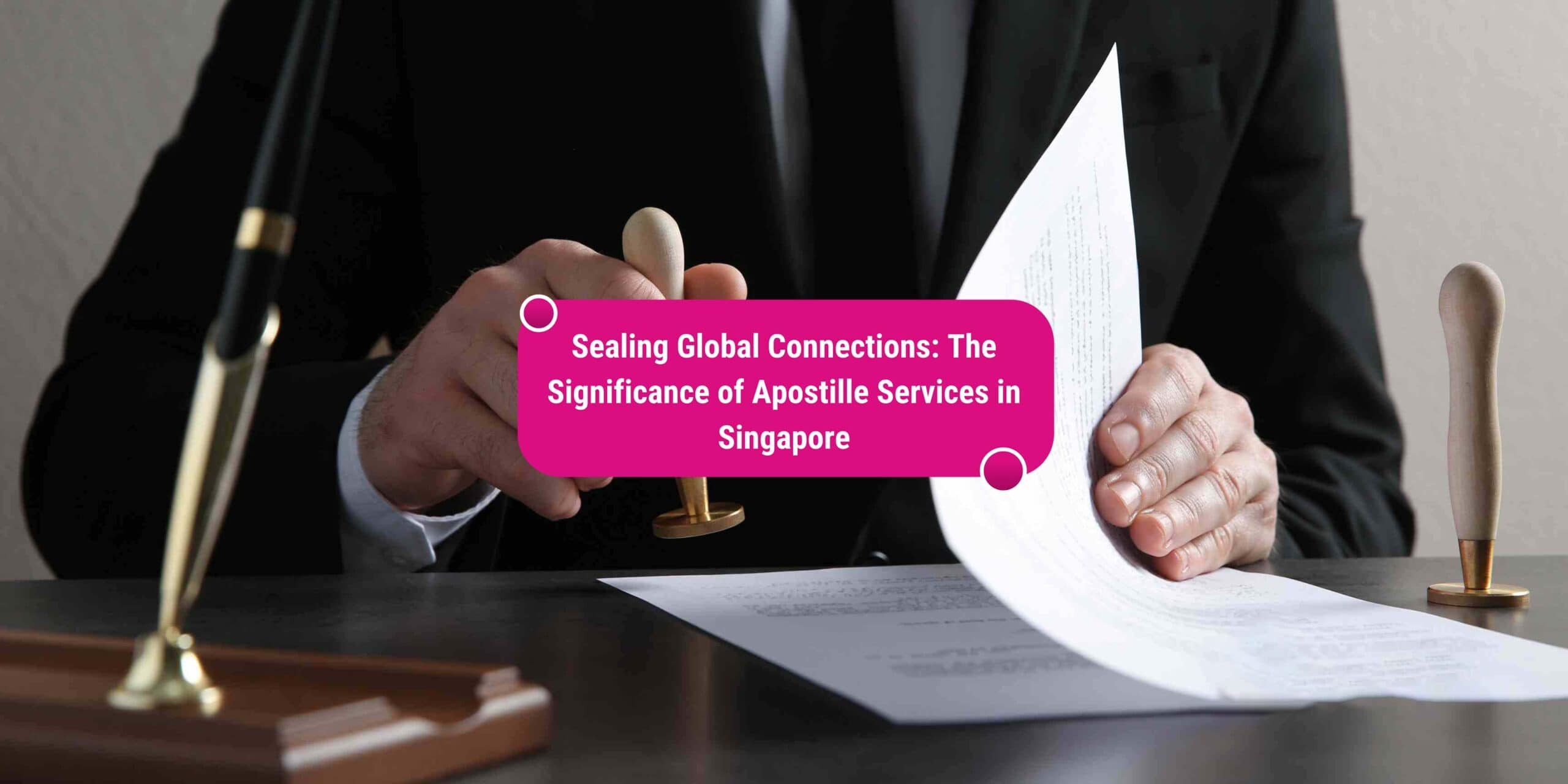There are 20 countries on this date and more in the near future. Under the convention, the apostille only relates to the authenticity of the signature or stamp on the issue, the place where the issue is located, the names of the businessman or the identity of the seal or stamp. Therefore, an apostille in English or French is a standardizing format issued by the Competent Authority. In Singapore, the Competent Authority for apostille is at the Attorney General’s Chambers. Singaporeans and foreign residents who issue public documents with Singaporean call or distinctive style should visit the Attorney General’s Chambers to examine the official document.
We’re pretty sure not many foreigners know what apostille is, or what apostille services entail. Perhaps, most Singaporeans are as ignorant. Apostille is a formality or certification under treaty by the Hague Convention Abolishing the Requirement of Legalisation for Foreign Public Documents (1961), to which Singapore is a contracting party. The convention came into force in Singapore on May 16, 1991. As of March 2015, 109 countries are party to the convention. The purpose of the convention is to get rid of legalisation or diplomatic intervention to validate or get recognition for public documents. Otherwise, courts and public authorities will not accept them as legally binding.
Understanding Apostille Services
In countries that are not part of the Convention, the process of certifying a document is done through a series of legalization stamps that are added to the document. The process starts with the competent authority of the country in which the document was issued and ends with the embassy or consulate representing the country where the document is to be used. In Singapore, once the document is verified by the Singapore Academy of Law (SAL), it is further verified by the Ministry of Foreign Affairs (MFA) for the country stated at the back of the document. In countries that are part of the Convention, the Apostille process eliminates the need for a full legalization process, and foreign public documents are recognized certifiably as valid when they are issued.
An Apostille is a form of authentication issued to documents for use in countries that participate in the Hague Convention of 1961. A number of countries are part of this convention, including Singapore. The function of the Apostille is to certify the authenticity of the signature on the document, the capacity in which the person signing the document has acted, and the identity of any stamp or seal affixed to the document. The Apostille further certifies the authenticity of the signature of the authority or the stamp or seal of the public official authenticated on the document. The country in which the Apostille is to be used is known as the receiving country. For example, if you have a Singaporean document which you intend to use in Italy, the receiving country is Italy.
Definition and Purpose
It is worth mentioning that the use of apostillization is not only by foreign business entities but also by local ones. Prime Minister of Japan Shinzo Abe commented that the use of the system would significantly change the niche of Japan’s business structure, become another important factor in promoting its economy, and also that in many countries, the real estate market will likely decrease. In fact, apostille translations of Japanese students are increasingly required, and conditionally foreign employers prefer applications submitted with an apostille.
Besides, lawyers in some countries believe that attested documents are faster and easier to use because there is no single model form of an apostille. As a result, the document is quickly transformed into one of the standard languages, except French.
The latter means that apostilling becomes not only a guarantee of the authenticity of the signature and the translating authenticity of the powers, but also an obligatory indication that the document itself is competent and subject to transfer of authority.
Secondly, the electronic transaction of apostille is now possible, and the legal requirements increasingly oblige businesses in foreign countries, such as foreign exchange transactions, purchase of real estate, and other actions.
Firstly, the apostille is indispensable for establishing the right to travel abroad. This is provided for according to specific requirements for a large number of sovereign states, and its legalization has to be organized in a certain way.
The Apostille convention is the convention that abolished the requirement of legalization for foreign public documents made in the jurisdiction of another contracting state. The apostille has many important uses and meanings nowadays.
Apostille is a type of attestation wherein a document is legalized. Authentication and legalization of any important document, including notarizations of signatures, are done by officers working in the government and for the government. This official procedure is called the apostille.
How Apostille Services Work
Apostille services are intended primarily to be used in countries that are parties to the Hague Convention. Upon complying with the notarization and witnessing practices that are appropriate under local laws with an appropriate public official, an apostille certificate is then attached to the original document, thereby certifying the seal and signature of the public official who has executed and authenticated the documents, enabling the legalization of notarized or certified documents as authentic for use in another party member country. This certificate has a standard form and layout to ensure that the authenticity of the documents can be confirmed easily. It typically consists of the following important information about the relevant documents: (a) the stem and title ‘Apostille’, (b) the name of the country from which the documents originated, (c) the name of the person signing the document, be it a public official or lawyer, (d) the capacity in which the person signed, (e) the details of any seal on the document, if applicable, (f) place of certification, (g) date of certification, (h) issued by, (i) the certificate number, (j) the stamp or signature of the authorized body, (k) the seal of the authorized body, and (l) the signature of the authority issuing the certificate.
The apostille services refer to the legalization of notarized documents for official use in countries that are parties to the Hague Convention of 1961. These services are vital in ensuring the legitimacy and validity of many legal documents, especially contracts between parties and in the verification of the authenticity of the signer or executor of the documents. Today, as the world becomes a smaller place in which to do business, apostille services are crucial in facilitating the free movement of goods and increasingly cross-border trade, acting as the crucial element that seals global connections. Apostille services are therefore highly relevant to both local and international enterprises that operate between contracting countries, ensuring that their documents are attested and secured and thereby avoiding problems when official documents are produced for the purposes of conducting business across borders.
The Importance of Apostille Services in Singapore
The concept of apostilles has made great strides in promoting worldwide commercial interaction. Because business and cultural relationships now stretch between many different countries, the need for apostille services has also increased. Singapore is also a major commercial hub in Asia and a key strategic location in the region, witnessing a rising demand for apostille services in the processes of moving from paper to digital. Singapore’s ASEAN-based enterprises benefit greatly from the Singapore-Hague Convention due to effective cooperation with other countries that are Partners of the Convention. There are approximately 3,500 registered companies in Singapore, and this figure continues to increase thanks to Singapore’s convenient investment environment.
Many businesses and government bodies often seek apostille services for document validation. In a globalized environment, apostille services have become a significant service in ending the hassles in apostilling documents. Putting the apostille on a document familiarizes the accepting authority that your document is authentic with its country of origin. Here are the common types of documents that can be apostilled: 1. Personal documents such as birth certificates, marriage certificates, and death certificates; 2. Commercial documents such as Articles of Amendment, Certificates of Good Standing, and Corporate Resolutions; 3. Educational documents such as high school diplomas and transcripts, university degrees and transcripts, and technical training diplomas. Equally, documents such as passports, certificates of naturalization, and company registers can be apostilled also.
Facilitating International Document Legalization
It is known that not all countries are members of the Hague Convention. According to one DOJ official, the realization was that the United States is not a signatory to the Hague Convention on Private International Law and many countries, particularly those in civil law jurisdictions, do not recognize or accept the apostille. Documents that are intended to be used in these countries must, therefore, undergo the traditional authentication process: signing by a notary, attestation or certification by government officials, and then authentication by the foreign country’s consular official. There used to be discrepancies because the requirements differ among countries. More notaries and judges now request a special issuing process to be performed by an assigned individual in the Min Law department or service office of the Singapore subordinate courts for the maintenance of such documents in a sealed and locked fire-resistant unit.
Singapore attests to its status as an international business hub or gateway through its plentiful international business and trade connections. International business dealings may involve the submission and exchange of various types of documents, such as articles of incorporation, certificates of incorporation, documents attesting to a company’s existence and due organization, supporting documents for trademark application or paper submissions, authorizations of agent, appointments of service of process, company free sale certificates, trademark corporate authorized agent letters to various foreign countries. It is common and necessary to get these documents attested or legalized, perhaps through Singapore notary public, Singapore High Court, Singapore MinLaw, and finally the consular department of the diplomatic or consular mission of the destination country. In other words, documents may require consular legalization. There is a need for consular authentication of administrative and court documents that are intended to be used abroad. To facilitate the process and for the abolition of the Requirement of Legalisation for Foreign Public Documents 1961, Singapore became a member of the Hague Convention Abolishing the Requirement of Legalisation for Foreign Public Documents of 5 October 1961 and has since been issuing apostille through the subordinate courts of Singapore.
Enhancing Global Business Transactions
Professional service and a quick turnaround time are the hallmarks of a good services provider of apostille services in Singapore. In proceeding to have documents apostilled, the communication flow between the service provider and the applicant firm should be increasingly swift and seamless, just like the ceaseless recourse of the island-state’s robust legislative framework. This way, documents will be processed in the shortest possible time, especially as applicants usually require their fully legalized documents to be collected or dispatched within a few days. Such a quick delivery turnaround is all the more important as rushed last minute orders are likely to result in service providers missing key collection slots at embassies.
Given that global commerce is Singapore’s lifeblood, is it any wonder that Singapore sees a bustling turnover of company incorporations? Each day, the island-state witnesses scores of foreign enterprises incorporated as private limited companies. This forms part of the regionalization thrust of EU, American, and other traders who operate physically in the business-friendly ambience of the Southeast Asian hub. What is more, while incorporating the Singaporean arm of their business, companies wish to ensure that they are equally adequately represented in terms of legalized documents. This engenders an increase in demand for apostille services in Singapore, as the embassies often require the highest class of incorporation documentation to be notarized and apostilled.
Strengthening Diplomatic Relations
The new treaty leaves no doubt that its intention is to strengthen relations between Singapore and the State of Qatar, relying on the principle of equality and non-interference in the internal affairs of both signatories, and the inviolability of their independence and sovereignty. It is apparent from her various statements that the Quenela alone must be drafted and signed in the presence of the competent authority, which is the Singapore Embassy officer or the local notary public, who has to add the reference to the previous, very specific advice of the Department of Legalization at the Ministry of Foreign Affairs. The Singapore’s Department of Legalization confirmed that this special wording is for the specific Qatar requirement. It is worth noting that what is expected of those dealing with the public and culture of Qatar is that they embody the core values of respect, trust, and integrity.
The welfare of many nations is contingent on the close ties formed among global players. The complexity of these relationships necessitates careful attention to nuances like cultural expectations, legal issues, and trade preferences, as governments go about negotiating bilateral and multilateral cultural and diplomatic accords. The State of Qatar’s choice of Singapore as the site for its first embassy in the region underscores her standing as an important centre for the world’s finance, shipping and trade activities. This is supported by the Mission of Qatar’s expressed appreciation for Singapore’s existing role in promoting deeper cooperation between the members of the Association of Southeast Asian Nations and the Gulf Cooperation Council, and the creation of a framework to stimulate the growth of improved economic and political collaboration in their joint effort to seek a mutually beneficial future.
Choosing the Right Apostille Service Provider in Singapore
The Inland Revenue Authority of Singapore (IRAS), the Singapore Education Services (SEAB), and the relevant country’s government authorities appear to be associated with providing the necessary endorsements to ensure that the documents are suitable for submission to the Ministry. However, please note that this is for a single case, such as for an individual submitting a tax return statement. Persons submitting business documents must almost always engage the services of a public accounting firm. Separately, several government authorities in Singapore are known for their swiftness in rendering such endorsements (even only the statutory declarations requested by prospective Apostille service providers are at times duly signed by these authorities within an hour), which must be taken into consideration as well. Such corporate service providers can arrange, within a short time, for the required processing at the jurisdictional and embassy/consulate levels, as well as at Singapore-related government authorities and return the completed, fully legalized certificates. These corporate service providers can also assist with translating the prospects’ documents if necessary and in any number of languages, to obtain notarial endorsements before or after obtaining the government authorities’ endorsements.
Cost is a major factor, particularly when it is the embassy- or consulate-legalized set that must first be submitted to the Ministry for obtaining Apostille certification. Ease of doing business is yet another factor. However, while most embassies and consulates will point persons with documents emanating from their country to an appropriate authority or forum to have the same legalized, several of these consulates and embassies also provide such legalization services to the public. Indeed, some consulates/embassies also offer support permitting persons to obtain corresponding documents, such as marriage certificates, police clearance certificates, birth certificates, etc., from that country’s authority or system. In short, one of the above or a similar service provider internationally, who can assist with obtaining replacement documents, notarize them, and then procure Apostille certification on the same without significantly delaying the process, must be selected where the document has to be submitted in a country that is unconnected to a Hague country.



